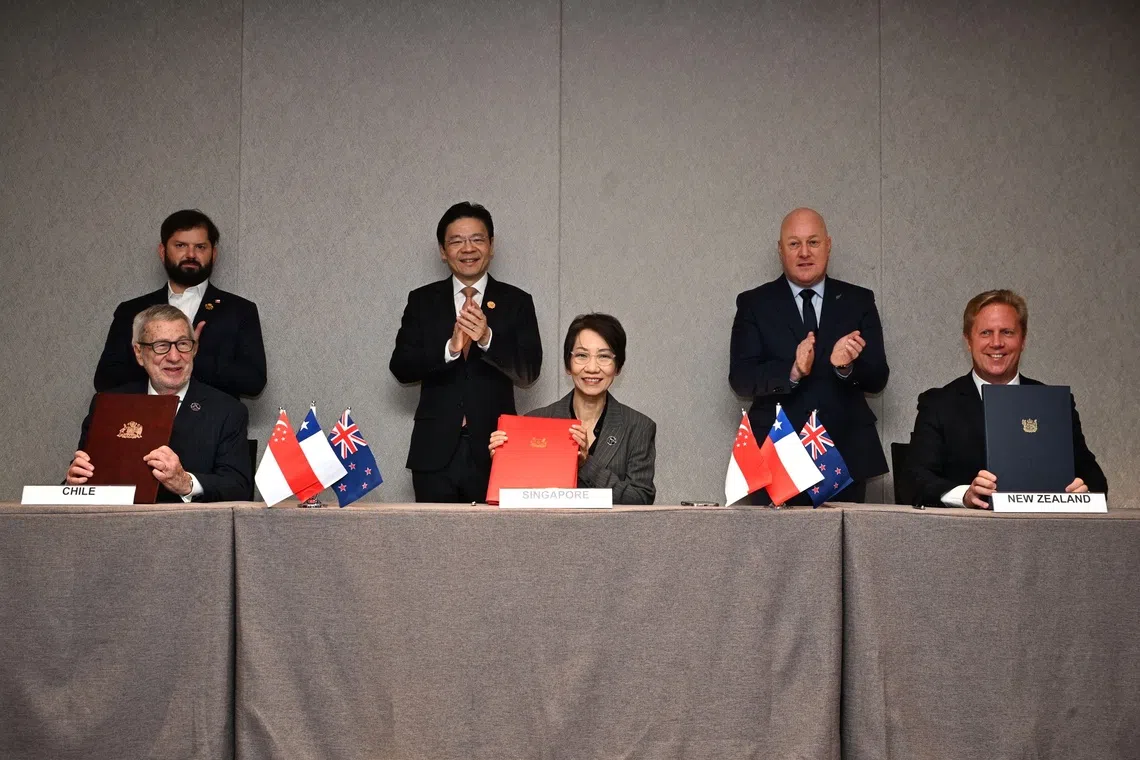GYEONGJU, South Korea – The collective leadership of Apec’s 21 economies is needed to reform and strengthen the World Trade Organisation (WTO) so that it stays effective and relevant, Prime Minister Lawrence Wong said at the annual Asia-Pacific Economic Cooperation (Apec) summit.
While the WTO is not perfect, countries should not seek to abandon the trade body, but rather to improve it, he said on Oct 31 at a session of the Apec Economic Leaders’ Meeting (AELM), which runs from Oct 31 to Nov 1 in Gyeongju, South Korea.
Noting that 2025’s meeting was taking place amid multilateralism under pressure and a global economy facing headwinds, PM Wong called on Apec members to support new mechanisms for “outcome-oriented decision-making” at the WTO, as its current consensus principles have become a recipe for paralysis.
They should also embrace flexible multilateralism, so that like-minded countries can move first to respond to new and emerging issues, while others can join when they are ready, he added.
PM Wong’s remarks came days after WTO chief Ngozi Okonjo-Iweala called for reform of the trade body’s consensus rule, which requires unanimous agreement among its 166 members to secure global trade deals.
A new approach is needed, particularly as the global trading system is undergoing its largest disruption in eight decades, Dr Okonjo-Iweala said on Oct 28.
On Oct 31, PM Wong echoed calls by other Apec leaders to lend their political support to launch the reform process when WTO members meet in Cameroon in March 2026. The meeting, which takes place every two years, is the highest decision-making platform for the 30-year-old trade body.
“Apec was founded with the mission to champion free and open trade and investments in the Asia-Pacific region,” he noted. “This mission is now more important than ever, and it is our collective leadership that will enable us to achieve this.”
PM Wong also outlined other ways for Apec economies to shore up the rules-based multilateral trading system.
For instance, cooperation across different trade groupings should be stepped up to move closer to countries’ longer-term goal of a free trade area of the Asia-Pacific.
He noted that there are already comprehensive free trade deals like the Comprehensive and Progressive Agreement for Trans-Pacific Partnership (CPTPP) and the Regional Comprehensive Economic Partnership (RCEP).
“These are important building blocks, and we should build bridges between them to promote interoperability,” he said.
The CPTPP is a free trade agreement first signed in 2018 which now has 12 members, including Japan, the United Kingdom, Canada and Mexico. It evolved out of a smaller grouping founded by Singapore along with three other Apec nations: Chile, New Zealand and Brunei.
PM Wong also cited sectoral agreements like the Digital Economy Partnership Agreement (Depa) and
which he said can bring about a gradual alignment of standards and rules in these new areas.

Earlier on Oct 31, Singapore, Chile and New Zealand announced that they had launched negotiations on Gepa, a green trade pact that could include cooperation in areas such as sustainable aviation fuel, carbon credits and renewable energy certificates.
Depa, which facilitates digital trade, was signed in 2020 between the same three countries. South Korea joined as the fourth member in 2024, and China is among nine other economies keen to be included.
Several small, trade-dependent economies like Singapore have also started new platforms, such as the Future of Investment and Trade Partnership.
Apec can nurture these initiatives and scale up the promising ones so that the region remains open, connected and conducive for trade and investments, said PM Wong.
Apec economies should also explore practical projects with the private sector in areas like trade facilitation, he added.
Simplifying and digitising trade processes is a concrete way to remove red tape and reduce business costs, and PM Wong said he looked forward to the establishment of an Apec Centre of Excellence for Paperless Trade.
“We can transform Apec into a paperless trade region, driving efficiency while accelerating sustainability and integration,” he said.
While these are uncertain times, PM Wong said Apec can make a difference by embracing cooperation, being pragmatic and staying forward-looking.
“Doing so will deliver tangible outcomes for our economies, while reinforcing the rules-based global order,” he said. “Singapore looks forward to working with all Apec economies to build a global system that benefits everyone.”
Apart from the AELM, PM Wong also attended a dialogue session with the Apec Business Advisory Council (ABAC) and held bilateral meetings with foreign counterparts.
In a post on social media platform X, formerly known as Twitter, PM Wong said he was grateful for the work of Singapore’s representatives at ABAC: Singapore Business Federation chief executive officer Kok Ping Soon; Keppel Data Centres chief executive officer Wong Wai Meng; and OCBC Bank’s head of global corporate banking Elaine Lam.
He thanked the trio for their work to launch the Apec Centre for Paperless Trade in Singapore, and for helping businesses trade more efficiently.
In a separate post on X, PM Wong said it was good to reconnect with Abu Dhabi’s Crown Prince, Sheikh Khaled Mohamed Zayed Al Nahyan.
“As Singapore and the United Arab Emirates mark 40 years of friendship, we spoke about deepening our partnership, including in energy, artificial intelligence and digital governance.”
